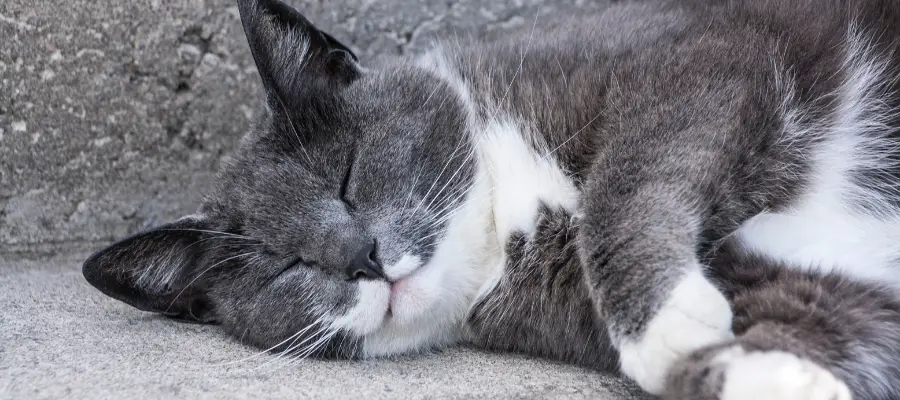How long do house cats live?
- House cats lives for an average of 10 to 15 years, other live much longer
- Cats that have been neutered usually live longer compared to those who haven’t
- Female cats tend to live longer that male cats
Are you a new cat owner? Or do you have a house cat that you love so much, you never want to lose him? Or maybe you want to adopt a house cat so you’re curious how long they will live?
If any of these ring a bell then you’re in the right place.
Generally, How Long Do House Cats Live?
Here is a table showing the average lifespan of house cats by breed.
| House Cat | Average Lifespan |
|---|---|
| Siamese | 12 – 20 years |
| Siberian | 10 -18 years |
| Tabby | 10 -15 years |
| Tuxedo | 10 -15 years |
| Calico | 12 -15 years |
| Bengal | 14 -16 years |
| Burmese | 16 – 18 years |
| Savannah | 12 – 20 years |
| Ragdoll | 15 to 18 years |
| Russian Blue | 15 to 20 years |
| American Shorthair | 15 to 20 years |
| Sphynx | 10 to 15 years |
| Manx | 8 to 14 years |
| Persian | 10 to 17 years |
| Maine Coon | 10 to 13 years |
| Munchkin | 12 to 15 years |
In general, the average lifespan of house cats is 10 to 15 years. They tend to live longer than their outdoor counterparts who average at 7 years.
Did you know the world record for the longest living house cat is 38 years and 3 days old? This is exceedingly rare though.
Various factors determine the life span of house cats: the cat’s environment, cat breed, routine medical care and, proper diet and nutrition are some of the factors. We shall cover some of these factors in this article.
As you can see, the American Shorthair, Russian Blue, and the Siamese leading the line; while The Maine Coon and The Manx being on the lower end of life expectancy.
Related article: Rare types of cats
Do Male or Female Cats Live Longer?
Female cats tend to live longer than male cats.
According to American Veterinarians cats that have been neutered usually live longer than cats who haven’t.
In the case of desexed females they tend to live longer by 39%. This is partly due to the health risks in mating and pregnancy complications.
For the males, desexed ones live 62 % longer, because most males travel longer despite dangers along the way looking to mate.
Other than longevity, there are many other benefits of desexing cats. It’s actually mandatory to desex cats in places like Australia. [1]
Do Cats Live Longer When Loved?

Yes, cats live longer when loved. When you the cat parent provide a loving environment for your house cats’, studies do show that they tend to live longer.
Here are things you can do to prolong your cat’s life:
1. Watching your cat’s diet
This entails ensuring the cat gets the nutrients she needs, at proper intervals. This will mean a better quality of life and the longer she will live.
2. Making friends with the vet and dentist
This will ensure that any dental or health problems are quickly spotted and treated, and when vaccination is required your cat gets it at the right time.
3. Provide a fun environment indoors
Having toys and play areas for your cat within your compound will ensure the cat doesn’t go outdoors where it’s dangerous because of cars and all sorts of hazardous materials.
4. Petting and brushing
Whenever you play with your cat and pet or brush him it is easier to notice any changes in his body, including things like lumps and bumps. The earlier you notice this the quicker it can be taken care of leading to a longer lifespan.
What Is Considered Old Age For A Cat?
There are 6 life stages to a cat’s life. Old age is considered when the cat gets to the senior stage between 11-14 years.
Here is a summary of a cat’s life stages.
- Kitten (0-6 months) – During this phase, they are growing very fast and undergoing a lot of learning about themselves and their surroundings.
- Junior (6 months-2 years) – During this phase, the cat is growing to its full size and adapting new skills.
- Prime (3-6 years) – At this time the cat is at optimum physical fitness
- Mature (7-10 years) – From this point cats start to be referred to as old and begin to gain weight.
- Senior (11-14 years) – At this age, they have now lost their speed and will require periodic checkups for their health
- Super senior/geriatric (15 years and older) – Depending on the life of the cat they may be slow or still have a bit of pace, or they might prefer comfortable spots to sleep often.
CONCLUSION
So how long does a cat house live? 10 to 15 years on average but with love and care you can increase your house cat’s lifespan by a couple of years.


